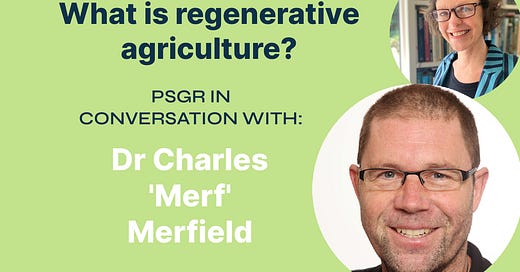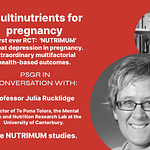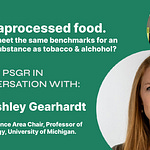Dr Charles ‘Merf’ Merfield (HND Comm. Hort., M.Appl.Sci. Hons, PhD, MRSNZ) is perhaps best described as an agroecological agronomist. Merf is head of the Future Farming Centre, Lincoln, New Zealand with research work traversing science and practice across agricultural and horticultural systems. Merf has a particular interest in non-chemical weed management.
This podcast sheds light on the extensive research that has been undertaken for decades in the agroecology space.
While most people are familiar with ‘organic’ - they’re less familiar with the term ‘agroecology’, which has an enormous research literature supporting it. More research to shed light on agriculture which can be sustained for decades, if not centuries without degrading soil and system health is needed, but is often a poor cousin to more exciting science that might get published in prestigious journals:
A lot of the important science, is incredibly dull, boring, foot soldier kind of science. It’s not breath-taking, it’s not cutting-edge. It’s none of those. But it’s desperately important for the future.
‘Organic’ and ‘regenerative’ agriculture are categories within a wider spectrum of agroecological science, research and practice that concern the stewardship of soil; the reduction of use of chemical treatments such as pesticides; and the protection of plant and animal health - and indeed, the health of farmers and farming families.
Farmers and growers are often denigrated for sticking to industrial and chemical agriculture, but the research and information pathways are often not there that give farmers and growers security that they can pay the bills, and change practices for better.
We discuss how social media has enabled like-minded farmers to come together and problem-solve, filling a large gap in knowledge-systems that was left vacant when science-based extension services (which provided feedback loops, back into the science community) were defunded years ago.
The discussion ends with the dilemma that farmers/growers are viewed as pariahs and polluters, but that political, social and economic pressures have consistently forced farmers to intensify.
‘If you want to fix farming and growing, you need to say ‘we want a farming system that is sustainable, that can be sustained for thousands of years and provide the kind of nutritious food that we need to live healthy lives, rather than a food system that is creating massive health problems such as obesity and diseases of wealth.’
This podcast explores this journey, discusses Merf’s research background, sheds light on forms of agriculture which place less stress on soil, plants, animals and farmers.
Lang S., Grelet G., Merfield C., Calhoun N. et al (2021) Regenerative agriculture in Aotearoa New Zealand– research pathways to build science-based evidence and national narratives.
https://mro.massey.ac.nz/server/api/core/bitstreams/a6c8c77d-e9b8-4177-9e8b-342c3ff87e4d/content
Interview with JR Bruning (BBus.Agribusiness; MA Sociology).
Video with slide presentation available on YouTube, Rumble or Odysee.
If you are based in New Zealand please consider joining PSGR.org.nz and supporting us. PSGR is a registered charity.















Share this post